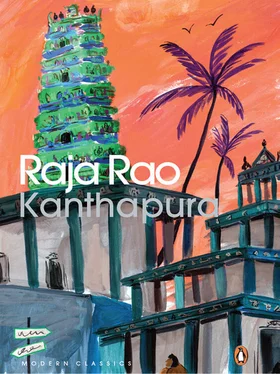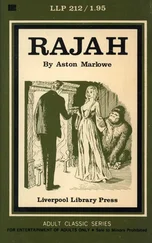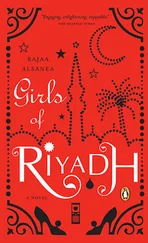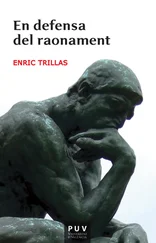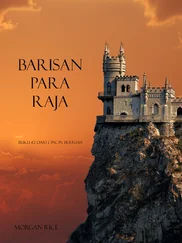Raja Rao - Kanthapura
Здесь есть возможность читать онлайн «Raja Rao - Kanthapura» весь текст электронной книги совершенно бесплатно (целиком полную версию без сокращений). В некоторых случаях можно слушать аудио, скачать через торрент в формате fb2 и присутствует краткое содержание. Год выпуска: 2014, Издательство: Penguin, Жанр: Классическая проза, на английском языке. Описание произведения, (предисловие) а так же отзывы посетителей доступны на портале библиотеки ЛибКат.
- Название:Kanthapura
- Автор:
- Издательство:Penguin
- Жанр:
- Год:2014
- ISBN:нет данных
- Рейтинг книги:3 / 5. Голосов: 1
-
Избранное:Добавить в избранное
- Отзывы:
-
Ваша оценка:
- 60
- 1
- 2
- 3
- 4
- 5
Kanthapura: краткое содержание, описание и аннотация
Предлагаем к чтению аннотацию, описание, краткое содержание или предисловие (зависит от того, что написал сам автор книги «Kanthapura»). Если вы не нашли необходимую информацию о книге — напишите в комментариях, мы постараемся отыскать её.
Kanthapura — читать онлайн бесплатно полную книгу (весь текст) целиком
Ниже представлен текст книги, разбитый по страницам. Система сохранения места последней прочитанной страницы, позволяет с удобством читать онлайн бесплатно книгу «Kanthapura», без необходимости каждый раз заново искать на чём Вы остановились. Поставьте закладку, и сможете в любой момент перейти на страницу, на которой закончили чтение.
Интервал:
Закладка:
But when the marriage day draws near, she sends her elder daughter to every house, saying, ‘Tell them you shall not light your kitchen fires for one whole week, and, if you like, for ten whole days. I am not marrying my daughter to Advocate Seenappa for nothing.’ And everybody asks, ‘I think it’s an advocate your sister is marrying?’ and Venkamma’s elder daughter says, ‘Yes, our Ranga is the most fortunate of us all; his father owns three villages and a coconut garden, and a small coffee plantation in Mysore, and their family is called the “bell people”, as his grandfather distributed holy bells to every guest that stayed with them.’ And Satamma says, ‘My daughter had not that luck,’ and Nanjamma says, ‘My daughter hadn’t that luck either.’ But on the first day, as the bridegrooms’ procession came along, and we all stood by the village gate, with coconuts and kumkum water to welcome him, what should we see but a middle-aged man, with two fallen teeth and a big twisted moustache. But Venkamma said he was only twenty- five, and he had married at seventeen, and his elder daughter was only seven years old, but we all knew that it came out of Venkamma’s head. But Bhatta said he was only about thirty, and that he earned at least three hundred rupees a month; that he had sixty acres of wet land and two hundred acres of dry land, and that his sisters wore half-seer gold belts and diamond earrings and Dharmawar saris, and that they gave the bride a full-seer gold belt; and it was said they would give us a French sovereign each, and indeed every woman of Kanthapura was given a French sovereign. And what a party the marriage was, with jokes and feasts and festive lights, and we all said, ‘This Bhatta and Venkamma are not so wicked after all,’ and Bhatta said to Venkamma, ‘Let everybody be well satisfied,’ and Venkamma said, ‘So they shall be!’ and every Pariah and cur in Kanthapura was satisfied. Only Moorthy wandered by the river all day long, and when dusk fell and evening came he stole back home, hurried over the meal that Rangamma served, spread his bedding and laid himself down, thinking, how, how is one an outcaste?
10
Kartik has come to Kanthapura, sisters — Kartik has come with the glow of lights and the unpressed footstep of the wandering gods; white lights from clay trays and red lights from copper stands, and diamond lights that glow from the bowers of entrance leaves; lights that glow from banana trunks and mango twigs, yellow light behind white leaves, and green light behind yellow leaves, and white light behind green leaves; and night curls through the shadowed streets, and hissing over bellied boulders and hurrying through dallying drains, night curls through the Brahmin street and the Pariah street and the Potters’ street and the Weavers’ street and flapping through the mango grove, hangs clawed for one moment to the giant pipal, and then shooting across the broken fields, dies quietly into the river — and gods walk by lighted streets, blue gods and quiet gods and bright-eyed gods, and even as they walk in transparent flesh the dust gently sinks back to the earth, and many a child in Kanthapura sits late into the night to see the crown of this god and that god, and how many a god has chariots with steeds white as foam and queens so bright that the eyes shut themselves in fear lest they be blinded. Kartik is a month of the gods, and as the gods pass by the Potters’ street and the Weavers’ street, lights are lit to see them pass by. Kartik is a month of lights, sisters, and in Kanthapura when the dusk falls, children rush to the sanctum flame and the kitchen fire, and with broom grass and fuel chips and coconut rind they peel out fire and light clay pots and copper candelabras and glass lamps. Children light them all, so that when darkness hangs drooping down the eaves, gods may be seen passing by, blue gods and quiet gods and bright-eyed gods. And as they pass by, the dust sinks back into the earth, and night curls again through the shadows of the streets. Oh! have you seen the gods, sister?
Then when the night is on this side of the day, and the Kartik lights have died down, a child wakes up here and begins to cry and a cough is heard there, and in Suryanarayana’s house a lantern is seen in the courtyard, and the beat of feet is heard here and the hushed voices of men and women are heard there. Then there is a fuss and a flutter in Rangamma’s house, and everyone rubs his eyes and asks, ‘Sister, who is dying? Sister, who is dying?’ and Nanjamma says to her neighbour Ratnamma, ‘And old Ramakrishnayya? We saw him only yesterday evening at the river, and he looked so hale and healthy,’ and Postmaster Suryanarayana’s wife Satamma says, ‘No, surely it is the heart trouble of Rangamma,’ and then comes the roar of Waterfall Venkamma, ‘Ah, you will eat blood and mud I said, you widow, and here you are!’; and Pandit Venkateshia’s daughter-in-law Lakshmi takes her lantern and rushes to Venkamma and says, ‘And what is it, Venkamma?’—’Oh, daughter of the mother-in-law, what is it but that this Pariah-polluter has had royal visits?’—’But what is it, Venkamma, what?’—’Ah, you are a nice one, too, and three legs of a bedstead plus one makes four, does it or does it not, my daughter?’ And seeing Timmamma and Satamma she says, ‘Oh, don’t you see the policeman at the steps?’ and Timmamma swings the lantern, and beneath the bulging veranda stones is seen the gaunt figure of a policeman, and one by one as the men rise up and gather in the Post-office-house courtyard, the children wake up and rush to the hanging lanterns, broom grass and cattle grass in hand, and our Seenu says, ‘I’ll go,’ and as he gathers his shawl and goes to Rangamma’s door the policeman says he has no permission to let anyone in, and Seetharam comes along and Doré and Ramanna and the elders, and everybody gathers in the courtyard half covered and half awake, while from this lane and that lane rises the thin dust of Kartik lights re-lit.
And there is noise in this part of Rangamma’s house and that, and there comes the regular cry of Rangamma’s mother: ‘Oh, sinners, sinners, to have this in our old age!’ and Ramakrishnayya comes and spits across the courtyard and behind him comes Rangamma, a shawl thrown over her shoulders, and then there is seen a light in the front room and Surappa says, ‘We cannot see anything from here — come let us go up to Sami’s,’ and we all rush up there and standing on the veranda we see what is happening in Moorthy’s room. Over against the cracked wall Moorthy is standing, a bright light falling on his tight-lipped face, and the police inspector, a short, round man, is standing beside him, a notebook in his hand. In the middle of the room is a heap of books and charkas and cotton and folded cloth, and policemen in uniform are turning them this side and that, and trunks are laid open and boxes are slit through, and sometimes there is laughter. The voice of the police inspector is not heard. But now and again we see Moorthy’s head nodding — he merely nods and nods and seems to smile at nothing.
The police inspector then turns towards Badè Khan, who is now seen clearly in the lantern light, and shouts, ‘Bind this man!’ and when they are beginning to pull out ropes from their belts, there is noise in the street below, and there comes Rangè Gowda, Mada and a lantern with him, and when he sees the policemen, he says something to Mada, and Mada goes away, and before the cock has time to crow three times, there is Pariah Rachanna and Madanna and Lingayya and Lingayya’s woman, and they all gather at Rangamma’s door and cry out, ‘Hele! Hele! What are you doing with our master?’ and the policeman shouts, ‘He, shut up, you sons of my woman!’—’He, he, do you think we are going to be silent because of your beards and batons. ’—’If you are not silent, you will get a marriage greeting today!’—and Rachanna says, ‘Ah, I’ve seen your elders, you son of my concubine, and I shall see. ’—And at this the policeman grows so wild that he waves his lathi and Rachanna comes forward and says, ‘Hè, beat me if you have the courage!’ and Rangamma leans out of the veranda darkness into the starlight and says, ‘Hè, Rachanna, this must not be done!’ and Rachanna says, ‘And what is to be done, Mother? They are going to take away our master!’ And Rangè Gowda says something to Mada and Mada says something to Rachanna and Rachanna says something in the ear of everyone, and when Moorthy is seen on the threshold, the bright light of the police lantern falling on his knit face, Rachanna cries out, ‘Mahatma Gandhi ki jai!’ and the policeman rushes at them and bangs them with his lathi and Rachanna quavers out the louder, ‘Gandhi Mahatma ki jai!’ and other policemen come and bang them too, and the women raise such a clamour and cry that the crows and bats set up an obsequial wail, and the sparrows join them from the roofs and eaves and the cattle rise up in the byre and the creaking of their bones is heard. And then men rush from this street and that street, and the police inspector seeing this hesitates before coming down, and Rachanna barks out again, ‘Mahatma Gandhi ki jai!’ And the police inspector shouts, ‘Arrest that swine!’ and when they come to arrest him, everybody gets round him and says, ‘No, we’ll not give him up.’ And the police inspector orders, ‘Give them a licking,’ and from this side and that there is the bang of the lathi and men shriek and women weep and the children begin to cry and groan, and more and more men go forward towards Moorthy, and more policemen beat them, and then Moorthy says something to the police inspector and the police inspector nods his head, and Moorthy comes along the veranda and says, ‘Brothers!’ and there is such a silence that the Kartik lights glow brighter. ‘Brothers, in the name of the Mahatma, let there be peace and love and order. As long as there is a God in heaven and purity in our hearts evil cannot touch us. We hide nothing. We hurt none. And if these gentlemen want to arrest us, let them. Give yourself up to them. That is the true spirit of the satyagrahi. The Mahatma’— here the police inspector drags him back brutally, but Moorthy continues—’The Mahatma has often gone to prison. ’—and the police inspector gets so angry at this, that he gives a slap on Moorthy’s face, but Moorthy stands firm and says nothing. Then suddenly Rachanna shouts out from below, ‘Mahatma Gandhi ki jai! Come, brothers, come!’ and he rushes up the steps towards Moorthy, and suddenly, in sinister omen, all the Kartik lights seemed quenched, clay pots and candelabras and banana trunks and house after house became dark, and something so sinister kicked our backs that we all rush up behind Rachanna crying, ‘Mahatma Gandhi ki jai!’ and now the police catch Rachanna and the one behind him and the one behind the one who was behind him, and they spit on them and bind them with ropes, while at the other end of the courtyard is seen Rangamma, Badè Khan beside her. Then the police inspector thinks this is the right time to come down, for the lights were all out and the leaders all arrested, and as Moorthy is being dragged down the steps Rachanna’s wife and Madanna’s wife and Sampanna’s wife and Papamma and Sankamma and Veeramma come forward and cry out, ‘Oh, give us back our men and our master, our men and our master,’ but the police inspector says, ‘Give them a shoe-shower,’ and the policemen kick them in the back and on the head and in the stomach, and while Rachanna’s wife is crying, Madanna’s wife is squashed against a wall and her breasts squeezed. And Rangè Gowda, who has stood silent by the tamarind, when he sees this, rushes down and, stick in hand, gives one bang on the head of a policeman, and the policeman sinks down, and there is such a clamour again that the police inspector shouts, ‘Disperse the crowd!’ and he slips round the byre with Moorthy before him, while policemen beat the crowd this side and that side, and groans and moans and cries and coughs and oaths and bangs and kicks are heard, and more shouts of ‘Mahatma Gandhi ki jai! Mahatma Gandhi ki jai!’
Читать дальшеИнтервал:
Закладка:
Похожие книги на «Kanthapura»
Представляем Вашему вниманию похожие книги на «Kanthapura» списком для выбора. Мы отобрали схожую по названию и смыслу литературу в надежде предоставить читателям больше вариантов отыскать новые, интересные, ещё непрочитанные произведения.
Обсуждение, отзывы о книге «Kanthapura» и просто собственные мнения читателей. Оставьте ваши комментарии, напишите, что Вы думаете о произведении, его смысле или главных героях. Укажите что конкретно понравилось, а что нет, и почему Вы так считаете.
